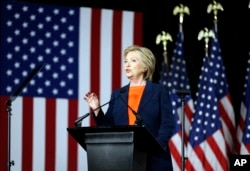With public anxiety over terrorist attacks on the rise in the U.S., presidential candidates Hillary Clinton and Donald Trump have tried to outflank each other to project toughness on terrorism.
Trump blames Clinton for promoting policies as secretary of state that have given rise to terrorism while Clinton says her Republican rival of lacking a real plan to fight terror.
But beyond the campaign rhetoric, just how steep are their differences over terrorism?
Differences
Quite steep, says terrorism scholar Max Abrahms who argues that their differences stem from how each views the root causes of terrorism.
Clinton subscribes to the "grievance model" of terrorism, the notion that terrorism is inspired by a sense of injustice, said Abrahms, a political science professor at Northeastern University in Boston.
Trump, by contrast, leans toward the "opportunity model," so named for the view that terrorism thrives when there is an opportunity for its growth, he said.
“I think that Hillary Clinton and Donald Trump subscribe to different schools of thought” on terrorism, Abrahms says.
Trump’s proposed ban on Muslims and aversion to “nation building” and Clinton’s openness to refugee resettlement and apparent penchant for promoting democracy in the Arab world can best be understood through this prism, Abrahms says.
But Michael O’Hanlon of the Brookings Institution, a Washington-based think tank, dismisses the notion of a stark philosophical difference between the two, arguing their positions on terrorism are much closer than their campaign speeches suggest.
Despite their deep differences over Muslim immigration, neither favors getting the U.S. militarily involved in the Middle East beyond doing “a little more than Barack Obama,” O’Hanlon says. “I’m not persuaded there is as big a difference as might seem the case."
Whatever their differences over terrorism, here is what the candidates themselves have said about fighting terrorism, from defeating Islamic State (IS) to protecting the homeland:
Clinton
Clinton's "Comprehensive Plan to Defeat ISIS and the Threat of Radical Jihadism" summarizes her position. ISIS is an acronym for Islamic State.
To defeat IS, the plan calls for working with a coalition of European and Middle Eastern nations, using drones and special operations forces, establishing a no-fly zone over northern Syria, and seeking a political settlement to the five-year Syrian conflict.
In addition, the plan advocates dismantling “the global network that supplies money, arms, propaganda and fighters to the terrorists.”
To fight homegrown terrorism, Clinton has proposed an "intelligence surge" to give law enforcement the edge in disrupting terrorist plots and a "lone wolf task force" to identify and stop radicalized individuals.
The former secretary of state sees the American Muslim community as critical to safeguarding the country against homegrown terrorism.
"These Americans may be our first, last and best defense against homegrown radicalization and terrorism," she said in a major speech last December.
She’s condemned Trump’s proposed Muslim ban but her plan mirrors the Republican’s in calling for "rigorous screening" of refugees and immigrants.
"I will not let anyone into our country that I think poses a risk to us," she said during the second presidential debate
Trump
With few exceptions, Trump’s plan to defeat IS and protect the American homeland largely mirrors Clinton’s.
Like Clinton, he supports stepping up air strikes against IS targets, working with moderate Middle Eastern allies, and establishing a no-fly zone over northern Syria.
But he differs in some areas. Unlike Clinton, Trump has pressed for working with Russia to fight IS and putting additional American boots on the ground. He also sees the Syrian regime as a potential ally in the anti-IS war, opposing arming rebels to overthrow the government.
No issue separates the two candidates more than terrorism, a hot-button electoral issue that that dominated the campaign debate over terrorism.
While Trump no longer hawks his controversial Muslim ban, he talks about “extreme vetting” of immigrants from Muslim nations to keep terrorists out of the country.
He also opposes admitting refugees from the Syrian conflict, warning that Clinton’s plan for resettling 65,000 Syrians could unleash a "Trojan horse" of terrorists on the American homeland.
"Wait till you see what happens in the coming years," Trump said ominously during the final presidential debate last week.
Trump says he wants to establish a “Commission on Radical Islam” to “expose the networks in our society that support radicalization.”
The Republican has acknowledged Islamophobia was a problem. But he told a Muslim-American questioner during the second presidential debate: “Muslims have to report the problems when they see them. If they don’t do that, it’s a very difficult situation for our country.”








